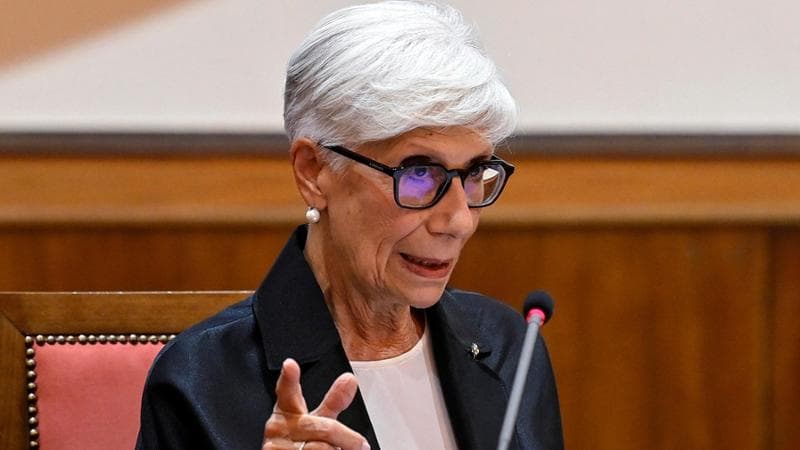Politics
The school of justice, the CSM splits, the secular and dressed right abstains from Sciarra

ROME – At the CSM, the votes for the Higher School of the Magistracy are once again being won by parties and not by merit. Seven city councilors to choose from, six professional and one layman, and now months of very heated conflicts and controversies. With the clear aim of the secular center-right council members to emphasize belonging and put merit in the background.
The fall is symbolic Silvana Sciarra, the labor law expert who was judge of Consulta for nine years and then president for a year. She applied to the school. But – for the law of the Council – it has an unforgivable “mistake”, namely that it was proposed by the Democratic Party in Parliament for the Constitutional Court. Where obviously everyone, even the center-right parties, voted for it to achieve a quorum. But to the Vice President’s CSM Fabio Pinelli, the lawyer chosen by the League for the Palazzo dei Marescialli, said membership was a “debt”. And that is why in the end the commission has three votes for Sciarra, that of the regional president Marcello Basilico, for Roberto D’Auria of Unicost and for the PD constitutionalist Roberto Romboli, while the two members of the independent judiciary, Dario Scaletta and Maria Luisa Mazzola and Claudia Eccher, laywoman of the League.
There were also disagreements last week in the vote on the six professional councilors who will join the School of the Magistracy board. Loredana Nazzicone, Roberto Giovanni Conti, Gian Andrea Chiesi and Vincenzo Sgubbi come from the Supreme Court, while Roberto Peroni Ranchet is a councilor at the Court of Appeal in Milan and Fabio Di Vizio is a prosecutor in Forlì. This time Basilico, Romboli, D’Auria and Mazzola voted in favor, while Eccher and Scaletta abstained. The Keeper of the Seals Carlo NordioHe had already chosen his five names at the end of December.
The CSM still lacks the vote of the plenary session. Therefore, the postponement of the current chairmanship of the board, chaired by the former president of Consulta Giorgio Lattanzi, for at least a few months is inevitable. But just as Vice President Pinelli is bragging about the efficiency of his CSM in his press conference, as he did a week ago, the school’s game ends amid very harsh controversies that have dragged on for months. While three city councilors – Mimma Miele from MD and the independents Roberto Fontana and Andrea Mirenda – had already issued a document in the autumn asking their colleagues to put aside day-to-day accounting and focus on the efficiency of appointments.
Now a note from the democratic judiciary initially complains about the violation of gender equality because “among the six proposed there is only one woman”. And what’s more, even among the five city councilors elected by Nordio, only one in five were women. In the end, out of twelve city councilors, only three will be women. So nothing but equality. And what’s more, the future City Council adopts Sciarra not even unanimously, but with the open hostility of the law of the judiciary and the laity towards the CSM. Md denounces other “critical profiles” due to “the almost exclusive presence of Supreme Court justices.” The left-wing current of the robes then recalls the demand made from the beginning for “pre-established and recognizable criteria and transparent procedures, which is far from the desire to create excessive tension and is certainly not aimed at demeaning the candidates, but …” to improve them, based on the idea that in a context of opacity, due respect for their abilities can never be achieved.”
A major conflict in the CSM, as seen in a long and very critical message sent yesterday by the Rome Public Prosecutor’s Office Mario Palazzi, who was among 85 judges seeking a seat on the school’s board, to the ANM mailing list. Palazzi, a leading representative of the Area Left, denies those who “permanently poisoned the climate of the proceedings and impaired the free and independent judgment of the members of the sixth commission.” His name, like that of other candidates, as Repubblica documented, had been persistently circulated among council members with a view to a possible division of the six seats between the currents. Palazzi speaks of himself this way: “I have been in the judiciary for 29 years and honor the robe I wear. I carried out the training activities in practice without interruption and without loss of time from the jurisdiction, but knowing that the exchange of experiences and the commitment, especially to the exchange with the new generations of colleagues, are among our main tasks.” And he adds: ” I have always been convinced that involvement in the activities of the association should never be seen as an asset, but neither should it create a stigma that excludes any possible performance evaluation.” Ciccio Zaccaro, the area secretary, summarizes Palazzi’s message as follows, which is obviously a broad one sparked debate in the lists: “I know his professional value and his experience as a coach. I’m sorry that he and others were vilified. I wouldn’t do it.” If we don’t want him to engage in demagoguery, we would end up with the paradox that those who have played an associative role are only punished for it.”
Repubblica, as is the duty of a free press, reported extensively on the conflict in the CSM over the school – because it was certainly a very tough conflict – and collected opinions, testimonies and freely expressed positions, not considering them “demagogic”. “, not even “denigrating”, but the result of a normal, open debate, which also aroused the MP’s curiosity Enrico Costa who questioned Minister Nordio about this.









